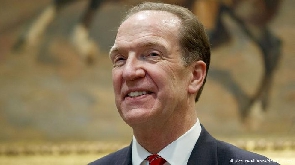 David Malpass, President of the World Bank Group
David Malpass, President of the World Bank Group
David Malpass, President of the World Bank Group, in an oped said girls are attending school in greater numbers than ever before- and women are increasingly entering the labour force and leading businesses.
Although we should celebrate this progress, he was however quick to point out that much work remains in order for a girl born today to have the same opportunities as a boy.
Research from the World Bank and others shows that unleashing the economic power of women can contribute to global growth. Moreover, it is the right thing to do. Fortunately, more countries recognize the economies can reach their full potential only with the full participation of both women and men.
The Bank’s 2020 Women, Business, and the Law report – which measures how laws and regulations affect economic opportunities for 2017, for example, Nepal, Sao Tome and Principe, and South Sudan have taken large strides to remove legal gender barriers. Likewise, Saudi Arabia changed its laws in order to protect women from unemployment discrimination, and to prohibit employers from dismissing a woman during pregnancy or maternity leave. And the United Arab Emirates amended its legislation to introduce equal pay and increase female representation in corporate boardrooms.
Governments are also taking steps to ensure that women and men can balance parenthood with work. In the last two years, Fiji has lengthened paid paternity leave, and – and along with Cyprus – introduced paid paternity leave. In addition, the United States recently adopted legislation to introduce paid family leave for federal employees.
Gender-focused policies and programmes can further enable girls and women to realise their economic potential.
These include targeted investments aimed at encouraging girls to stay in school longer, so that they are empowered with the education and skills they need to participate in the labour force as adults.
It is important that we place priority on the education of our female counterparts to enable them contribute their quota to development of society,
We are glad that World Bank Group stands ready to join forces with all stakeholders working to empower women and unleash their economic potential.
We think that it is now time to invest and translate the political commitments already made into concrete action.